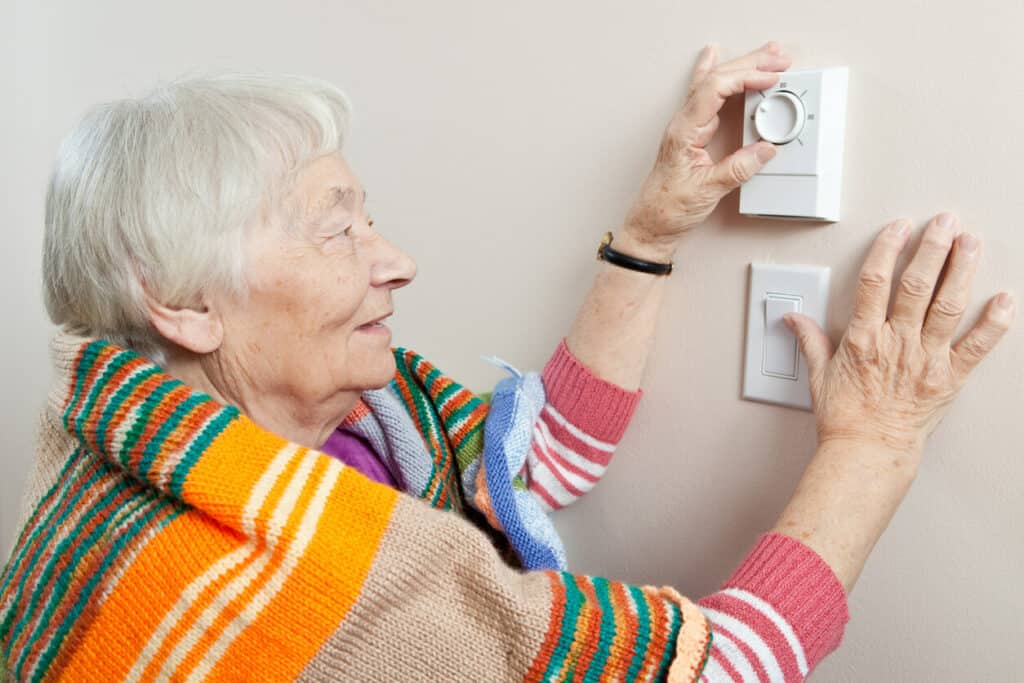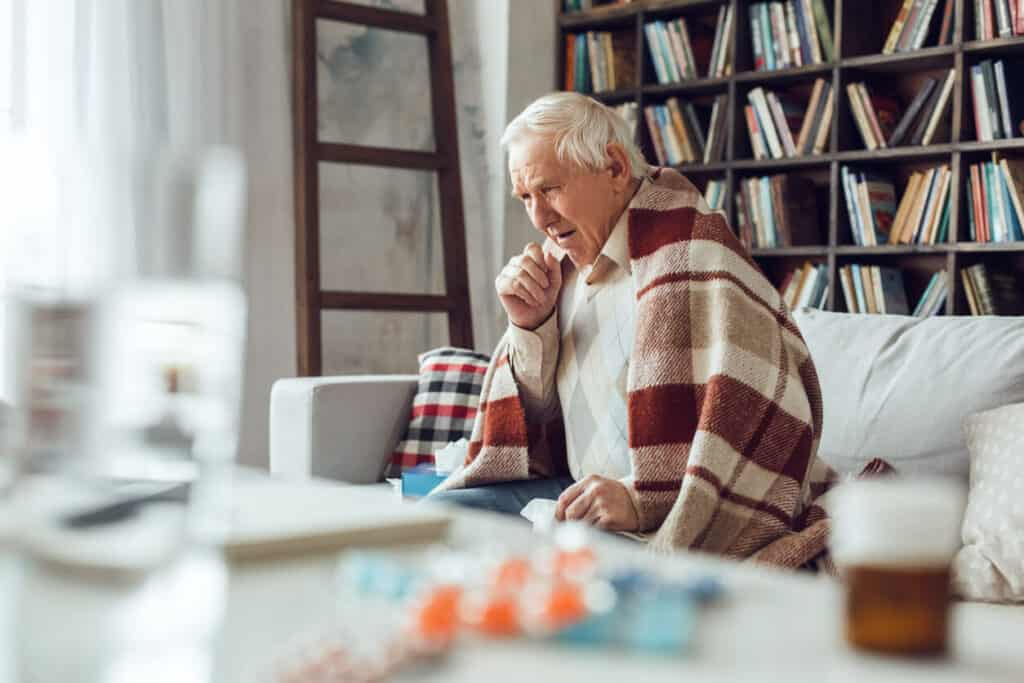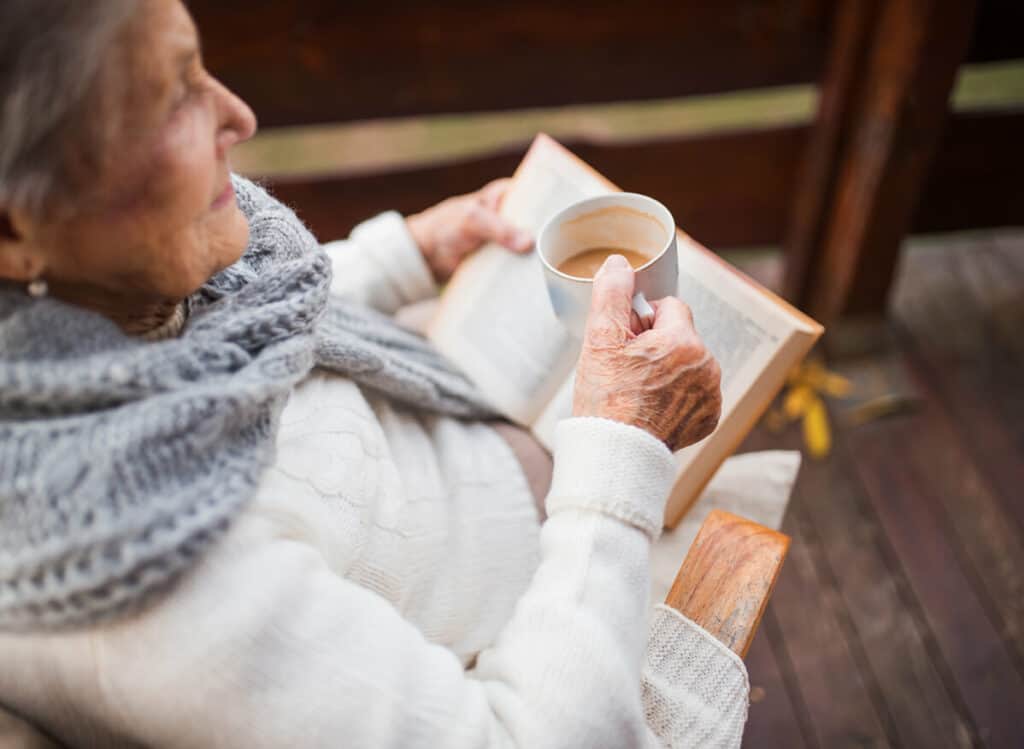As your loved ones age they may start to feel sensitive to temperature fluctuations and especially towards cold.
To answer the question why are old people always cold we need to consider a few factors. Some are related to aging while others are connected to various medical conditions.
It is important to be aware that your elderly feel cold, the risks involved with this, and what you can do to keep them warm.

Physical Changes
The reasons why seniors tend to get cold even in warm or hot weather may be explained with some body changes that occur as we age.
- Slower metabolism – With age the metabolic rate, or how fast our body burns the calories we receive from food, slows down and this can make us feel colder. The energy the body creates is not as abundant as in our prime years. The lower the energy inside, the faster our body temperature drops.
- Worsen blood circulation – Blood pressure problems are common with old age, but if our loved ones experience a low blood pressure, it may cause them to shiver. Bad circulation often results in cold hands and feet as it is more difficult for the heart to send blood to the extremities.
- Decreased blood vessel elasticity – Once the blood vessels have shrunk due to exposure to lower temperature of water, for example, it takes longer to dilate again and for the blood to warm up these parts of the body.
- Loss of fat closer to the skin – Human bodies accumulate fat in depos immediately under the skin until around 40 years of age. After that, and especially after the 70’s our bodies start losing this fat. This is why not only the way skin looks changes but you get colder as you get older.
- Reduced physical activity and movement – The less energy our bodies produce, the harder it is to move. Add to this the rest of the issues mentioned above and we can understand why it is difficult for older adults to be as physically active as earlier in life. The reduced levels of physical activity alone make it harder for the body to maintain normal temperature levels.

Health-Related Problems
Together with the processes associated with natural aging, it is possible that elders feel cold because they are suffering from one or more of the medical conditions on this list:
- Anemia
- Anorexia
- Atherosclerosis
- Cardiovascular disease
- Diabetes
- Parkinson’s disease
- Thyroid problems, especially hypothyroidism
- Sepsis
- Drug or alcohol addiction
Each of these diseases can affect the blood circulation, body temperature regulation as well as the perception of the internal body temperature.
Cold sensitivity can also be experienced as a side effect of some medications intake, such as over-the-counter cold medicines, beta-blockers, sedatives, antidepressants, and others.
If you suspect one of these to be the cause for feeling cold, an alternative treatment with the physician should be discussed.
Signs of cold intolerance
Noticing the signs that an older adult is uncomfortable or cold all the time is important as this may have serious implications to their health.
The most common indications that your beloved seniors are sensitive to cold could be:
- Pale and cool to touch skin
- Shivering even in warm temperatures
- Cold, twitching or fumbling hands
- Slow or shallow breathing
- Slower than normal or slurred speech
- Unprovoked anger
- Coordination loss or confusion
- Feeling lethargic or exhausted
- Memory loss
Understanding the risks
Being exposed to extremely cold temperatures can be perilous for anyone. As older adults are often cold even when temperatures are mild, their complaints may be overlooked. At Amy’s Eden our caregivers are trained to avoid that.
The dangers for your loved ones of feeling cold for a prolonged time could be quite severe as hypothermia carries serious risks. Hypothermia can occur when body temperature drops below 98 F. An older person is susceptible to it if the air temperature goes just below 60 F.
Some of the risks hypothermia poses to seniors could be of:
- Heart attack
- Kidney problems
- Stroke
- Liver problems
- Respiratory dysfunction
Tips to keep older adults warm
Cold temperatures could be fatal for older adults and at Amy’s Eden we are extremely aware of it. We know that to keep your loved ones safe, warm and cared for we need to

- Raise the room temperature in the house to above 68 F, as anything lower than this can be dangerous to them.
- Help them put on warm clothes. Layering the clothing is the best option as it is easier to remove or add an item according to how the person feels. Thermal underwear is really useful as well as accessories such as scarfs, shawls and hats.
- Provide nutritious food and warm beverages. Seniors should consume good size portions of hearty and healthy food. This will aid their body to regulate its temperature. Warm liquids like soup or tea will help keep the cold at bay as well.
- Encourage them to do physical activities. Movement raises body temperature in a natural way. Stretching, walking, and some indoor activities are all beneficial for blood circulation and general vigor.
Old people are often always cold because of a number of reasons including decreased blood flow and changes in their core body temperature regulation.
As people age, their blood flow naturally decreases, which can make it harder for them to stay warm.
This can also be compounded by other factors such as a change in diet, less physical activity, and other health problems. Wearing layers, including gloves and thick socks, can help to keep them warm, but it’s important for them to also talk to their doctor about any symptoms they may be experiencing
Additionally, older people may also have difficulty controlling their body temperature due to changes in their metabolism and the way they regulate heat.
There are many ways to address this, including making lifestyle changes such as staying active and eating a balanced diet. Some older people may also benefit from taking steps to improve their circulation and increase blood flow, including exercises and resources recommended by their doctor.
Before making any changes, it’s important to check with a healthcare professional to assess any risks and to make sure that the steps you’re taking are safe and appropriate for your individual needs.
Find support
Sensitivity to cold can occur as part of the natural aging process. Being aware of this and staying alert to how your aging beloved feels is important for their wellbeing.
Knowing the signs, understanding, and preventing the dangers of hypothermia for the seniors are part of the tasks of the professional caregivers at Amy’s Eden.
Our services will give you the peace of mind that your loved ones are looked after with great care and attention to detail.




